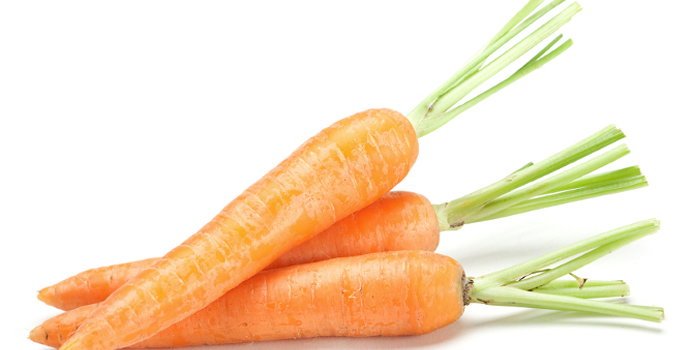Carrot juice is becoming more available in stores due to its flavorful taste and nutritional value. Carrot juice is packed full of phytonutrients, vitamins and minerals. It is commonly found added to vegetable juices and fruit juices because its sweet flavor blends well with a variety of other foods. Eating whole carrots is always the best choice for the benefit of the fiber but if you choose to drink carrot juices make sure to select choices with no added sugar. Carrots are sweet enough on their own and added sugar is unnecessary and can lead to eating excess calories. Even better, juice your own carrots at home and use the left over pulp for baking carrot muffins!
Nutritional Value of Carrot Juice
1 cup of Carrot Juice
Calories: 94
Fat: 0g
Protein: 2g
Carbohydrates: 22g / 7% DV
Fiber: 2g / 8% DV
Vitamin A: 45133IU / 903% DV
Vitamin C: 20.1mg / 33% DV
Vitamin K: 36.6mcg / 46% DV
Vitamin B: 60.5mg / 26% DV
The Health Benefits of Carrot Juice
- In addition to being low in fat and cholesterol, carrot juice is a good/high source of 9 vitamins and minerals! That means that in one cup of carrot juice, you are consuming more than 10% of 9 essential vitamins and minerals including; Vitamin E (Alpha Tocopherol), Thiamin, Phosphorus, Manganese, Vitamin K, Vitamin A, Vitamin C, Vitamin B6 and Potassium.
- Carrot juice has an amazing amount of vitamin A in it, over 900% of your DV! Vitamin A is a carotenoid that promotes normal vision and assists with seeing in the dark. It also promotes healthy cells, skin and tissues in your body by protecting you from infections. Additionally, it helps regulate the immune system and fights free radicals as an antioxidant.
- The color of carrots comes from carotenoids. There are over 600 identified carotenoids and they work by protecting your body from diseases and slowing the aging process.
- Vitamin C is also present in carrot juice. Vitamin C works as an antioxidant to slow damage caused by free radicals in body fluids and helps protect you from infection and boosts immunity by signaling for antibodies. It also helps keep gums healthy and improves the rate of healing for cuts and wounds. Some of this protection done by helping blood vessels and capillary walls stay strong. Vitamin C also plays a role in producing collagen, which is a connective tissue that holds muscles, tissues and bones together.
Things To Do With Carrot Juice
- For added nutrition, use carrot juice as a cooking liquid or added to sauces
- Instead of water, consider adding carrot juice to your muffins and baked foods for increased moisture, flavor and texture
- Make your own salad dressings at home and include a splash of carrot juice for a zesty take on oil and vinegar dressings
- Simmer pilaf and risotto recipes in some carrot juice
- Use as the base of glazes and bbq sauces for cooking protein sources like chicken or tofu

Emily DeLacey MS, RD is a Registered Dietitian and currently working in Jamaica as a HIV/ AIDS Prevention Specialist. She attended Central Washington University for her Bachelor's Degree in Science and Dietetics and continued on after her internship to Kent State University for her Master's Degree in Science and Nutrition, with a focus on public health and advocacy. She served as a U.S. Peace Corps Volunteer in Malawi 2012-2014 working as a Community Health Advisor in a rural village, immersing in the joys of life without electricity or running water. She has been to 20+ countries and 47 of the 50 states in the US. Traveling, adventuring and experiencing new cultures has made her a passionate advocate for the equality of nutrition and wellness for all people.



